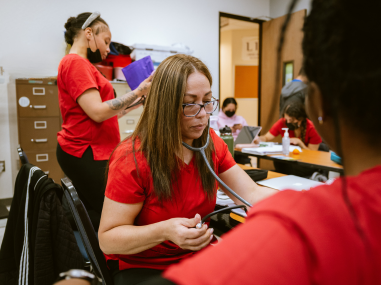Tipping Point invests in employment opportunities to create a Bay Area where quality, career-oriented jobs are within reach. Our grantees support workers in acquiring specific skills and competencies needed to enter jobs that can provide a stable foundation to start flourishing careers. However, workforce development systems focus on securing initial job placements for clients, and often lack programs to support workers throughout the lifecycle of their careers. In order to achieve quality jobs with sustainable wages, job seekers and workers need services that are designed for economic mobility and long-term career advancement. To meet this need, Tipping Point’s research and data team partnered with JobTrain and Opportunity Junction, grantee organizations that provide career counseling and job training to low-income residents, to design and test a new service called the Career Advancement Project (CAP).
CAP was born out of a research and design process, led by Tipping Point in which grantees explored and tested different approaches to better serve their client alumni in securing stronger jobs, initially culminating in a short (four-week) test of a prototype. JobTrain and Opportunity Junction subsequently secured additional funding to expand on their learnings to launch the CAP pilot model. The model leverages the existing relationships between the organization and its job training alumni to provide support in navigating career and education opportunities and challenges in the healthcare field. A key feature of its case management services is proactively engaging alumni in ongoing coaching services rather than relying on alumni to reach out on their own accord.
Tipping Point contracted with Leap Solutions to conduct an evaluation to learn about successes and challenges in implementing this innovative program, what difference it made for participants, and how it may serve as a model for supporting job seekers and workers throughout the Bay Area.
The evaluation of the first two years of the CAP pilot provides promising findings:
- Career coaches are valued partners, offering tools and knowledge to help alumni pursue more fulfilling or higher-paying jobs.
- Providing a combination of intentional relationship building and practical career guidance (i.e., leveraging connections, providing referrals, mock interviews, updated resumes, etc.) builds confidence and moves participants along their chosen career path over time.
- Early indicators suggest positive effects, including increases in average salary for participants who changed roles after participating in CAP.
As one CAP participant reported: “I feel more confident in my career path and in myself. If I wasn’t able to do the coaching, I think I would still be in the agency and having low pay, no benefits, working full time.”
Learn more about the program, view case studies, and explore findings for the field below.





